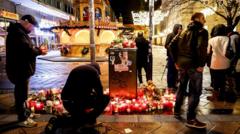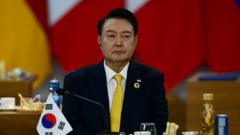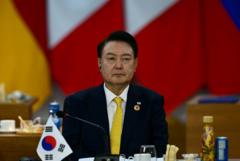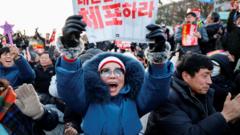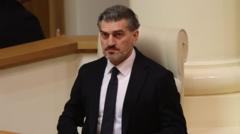Romania's Constitutional Court has cancelled the results of the first round of the presidential elections, prompting discussions about the integrity of the electoral process amid claims of external influence.
Romanian Court Overturns First Round of Presidential Election, Restarting Process
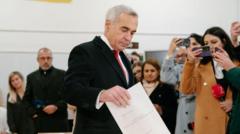
Romanian Court Overturns First Round of Presidential Election, Restarting Process
Court's decision comes after allegations of foreign interference in election results.
The Romanian Constitutional Court has declared the results of the first round of the presidential elections invalid, necessitating a complete restart of the electoral process. This announcement surfaces just days before the scheduled second round, leading to public scrutiny and political tension. The initial round saw far-right candidate Calin Georgescu securing a victory, claiming support amid accusations of a foreign electoral influence.
Georgescu, characterized as a little-known figure with far-right views, denounces the court's decision as an affront to democracy, labeling it a "formalized coup d'etat." With a winning percentage of 23%, the surprise frontrunner's ascent has drawn concerns regarding Russian interference, particularly after the release of intelligence documents suggesting external operations aimed at swaying Romanian voters on platforms such as TikTok.
Following the court's verdict, outgoing Prime Minister Marcel Ciolacu endorsed the annulment, describing it as a necessary response to the uncovering of significant distortions due to Russia's alleged meddling. Current President Klaus Iohannis affirmed his commitment to maintaining stability in Romania until a new president is installed, stressing that the country remains firmly pro-European and allied with NATO.
The judges, who initially hesitated to consider new evidence of external electoral influence, ultimately decided to order a complete re-run of the elections instead of conducting a recount or having a follow-up round on December 22. This decision raises questions about the validity of the political system and the voices of the nine million Romanians who expressed their preferences through the vote.
Opposition candidate Elena Lasconi has condemned the court's ruling as "illegal" and "immoral," arguing that it disregards the democratic will of the electorate. Two losing candidates' claims regarding Georgescu's campaign finances were also dismissed. As the nation grapples with these developments, the clarity of Romania's political landscape appears increasingly uncertain.
Georgescu, characterized as a little-known figure with far-right views, denounces the court's decision as an affront to democracy, labeling it a "formalized coup d'etat." With a winning percentage of 23%, the surprise frontrunner's ascent has drawn concerns regarding Russian interference, particularly after the release of intelligence documents suggesting external operations aimed at swaying Romanian voters on platforms such as TikTok.
Following the court's verdict, outgoing Prime Minister Marcel Ciolacu endorsed the annulment, describing it as a necessary response to the uncovering of significant distortions due to Russia's alleged meddling. Current President Klaus Iohannis affirmed his commitment to maintaining stability in Romania until a new president is installed, stressing that the country remains firmly pro-European and allied with NATO.
The judges, who initially hesitated to consider new evidence of external electoral influence, ultimately decided to order a complete re-run of the elections instead of conducting a recount or having a follow-up round on December 22. This decision raises questions about the validity of the political system and the voices of the nine million Romanians who expressed their preferences through the vote.
Opposition candidate Elena Lasconi has condemned the court's ruling as "illegal" and "immoral," arguing that it disregards the democratic will of the electorate. Two losing candidates' claims regarding Georgescu's campaign finances were also dismissed. As the nation grapples with these developments, the clarity of Romania's political landscape appears increasingly uncertain.

